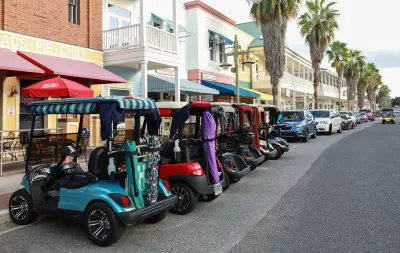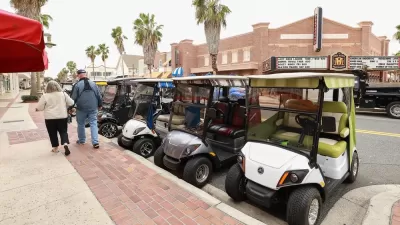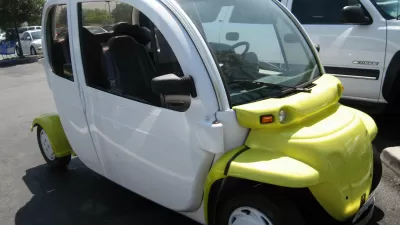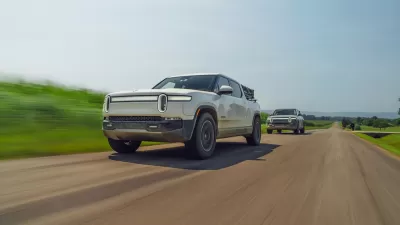More communities are catching on to the benefits of golf carts as a safe, low-emissions mode of transport for neighborhood trips.

In a piece extolling the virtues of golf carts, David Zipper argues that the diminutive vehicle could play a “starring role” in “the next chapter of urban mobility.”
According to a 2015 Harvard study, a “souped up golf cart” offered the most transformative option for future transportation. “Indeed, these puttering vehicles, most often associated with leisure and affluence, just might provide a pathway toward safe, affordable, and entertaining rides for the masses.”
Zipper outlines the benefits of golf carts: “Carts can be either gas-powered or electric, typically costing around $10,000, give or take a few thousand. They generally weigh 500 to 1,100 pounds and travel under 20 mph, making them significantly lighter and slower than a car. A roof provides protection from the sun; an optional plastic enclosure can keep users dry when it rains.”
As an example, Peachtree City outside Atlanta features 100 miles of paths designed for golf carts, pedestrians, and people on bikes or scooters that connect the community’s various destinations and have prompted many residents to replace short car trips with cart rides. Last year, Alissa Walker highlighted the benefits of golf carts in Florida’s The Villages, a 55-plus community whore residents rely on golf carts for many daily errands.
According to Peachtree City Mayor Kim Learnard, “[Golf carts] provide accessibility for residents who aren’t able to drive; they enable local shops to expand parking capacity (golf cart spots are significantly smaller than those for cars); the electric models are quiet and don’t pollute.” Learnard even believes golf carts lead to more social interactions between neighbors.
Zipper acknowledges the drawbacks of golf carts, such as their vulnerability to extreme weather conditions. “But golf carts could be a promising form factor for many places that lack the density to support high-frequency transit service.” As more people work from home, Zipper contends that golf carts and other types of micromobility devices can become a useful transportation mode for short neighborhood trips.
FULL STORY: Why golf carts—golf carts!—are a transportation mode of the future.

Maui's Vacation Rental Debate Turns Ugly
Verbal attacks, misinformation campaigns and fistfights plague a high-stakes debate to convert thousands of vacation rentals into long-term housing.

Planetizen Federal Action Tracker
A weekly monitor of how Trump’s orders and actions are impacting planners and planning in America.

San Francisco Suspends Traffic Calming Amidst Record Deaths
Citing “a challenging fiscal landscape,” the city will cease the program on the heels of 42 traffic deaths, including 24 pedestrians.

Defunct Pittsburgh Power Plant to Become Residential Tower
A decommissioned steam heat plant will be redeveloped into almost 100 affordable housing units.

Trump Prompts Restructuring of Transportation Research Board in “Unprecedented Overreach”
The TRB has eliminated more than half of its committees including those focused on climate, equity, and cities.

Amtrak Rolls Out New Orleans to Alabama “Mardi Gras” Train
The new service will operate morning and evening departures between Mobile and New Orleans.
Urban Design for Planners 1: Software Tools
This six-course series explores essential urban design concepts using open source software and equips planners with the tools they need to participate fully in the urban design process.
Planning for Universal Design
Learn the tools for implementing Universal Design in planning regulations.
Heyer Gruel & Associates PA
JM Goldson LLC
Custer County Colorado
City of Camden Redevelopment Agency
City of Astoria
Transportation Research & Education Center (TREC) at Portland State University
Jefferson Parish Government
Camden Redevelopment Agency
City of Claremont





























